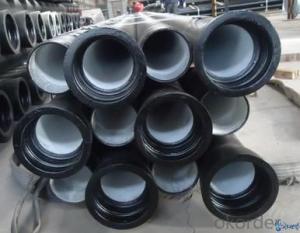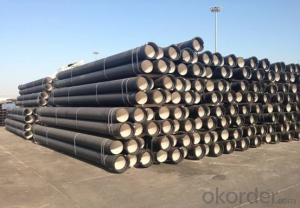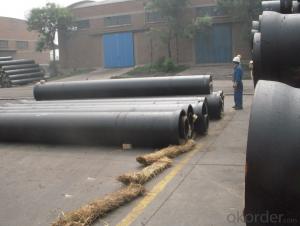DUCTILE IRON PIPES K7 DN300
- Loading Port:
- China Main Port
- Payment Terms:
- TT or LC
- Min Order Qty:
- 1 pc
- Supply Capability:
- -
OKorder Service Pledge
OKorder Financial Service
You Might Also Like
Ductile Iron Cast Pipe is without any defects compare with tradition casting tech, which has many advantages particularly as follow:
(1) High density. In the "vertical upward casting" process, the melt iron of centre liquid column in center crystallizer is continuously feeding for volume shrinkage caused by condensation tube at outer circumference , which lead to be free of shrinkage porosity.
(2) High purity. When melt iron pouring, the mixed impurities such as gas, dross, sand grain which are lighter than melt iron could be eliminated at furnace mouth, its impossible to enter into the crystallizer through the channel, so the melt iron into the crystallizer is very pure.
(3) Strength with toughness. The cooling speed provided by continuous crystallizer is 30 times than sand casting and 5 times than centrifugal casting, and doesn't produce white iron, the eutectic cell volume of continuous cast iron is one eighth to one tenth compare with traditional cast iron. The density of graphite nodule in ductile iron can reach 300-700 pcs/mm2. Therefore, all reason above improve the strength and toughness of continuous cast iron.
(4) Free machining. The high speed cooling make the hardening phase (such as boride, steadite) not appear like reticular, massive or thick, but diffuse like fish bone and pane in shape, moreover, there are tiny graphite flakes inlaid hardening phase. It's free machining in BrinellHardness the range of 250-300HB. However, the Brinell Hardness of 250 is top limit to common metal materials.
(5) High productivity. To the wall thickness of tube under 10mm, the speed of continuous casting is 1 meter/min, to the wall thickness of tube under 20mm, the speed of continuous casting is 0.5 meter/min, which is high efficiency that centrifugal or other casting tech couldn't reach.
Features of Ductile Iron Pipes:
. Ductile Iron Pipe offers proven reliability and the quality.
. It is quick and easy installation.
. The ductile iron pipe has high pressure capability.
- Q:Can ductile iron pipes be used in areas with high levels of groundwater contamination?
- Areas with high levels of groundwater contamination can make use of ductile iron pipes. Ductile iron, known for its strength and durability, is resistant to corrosion, making it suitable for various environments, including those with contaminated groundwater. It provides a high level of resistance to chemicals and can withstand the corrosive effects of contaminants that may be present in the groundwater. Furthermore, ductile iron pipes possess a protective lining, further enhancing their corrosion resistance. However, it is important to consider that the suitability of ductile iron pipes in such areas relies on the specific nature and concentration of contaminants in the groundwater. Seeking advice from experts and adhering to local regulations and industry standards is essential to ensure the proper selection and installation of pipes in areas with high levels of groundwater contamination.
- Q:Are ductile iron pipes suitable for tunneling projects?
- Ductile iron pipes are well-suited for tunneling projects due to their strength, durability, and flexibility. With their ability to endure high pressure and heavy loads, they are an excellent choice for underground tunnels. These pipes are also highly resistant to corrosion, which is vital in moist and chemical-laden underground environments. Furthermore, their installation and maintenance are relatively simple, making them a cost-effective option for tunneling endeavors. In summary, ductile iron pipes possess the essential characteristics needed for tunneling projects, making them a fitting selection for these applications.
- Q:Can ductile iron pipe be used for hydroelectric power generation?
- Yes, ductile iron pipe can be used for hydroelectric power generation. Ductile iron is a type of cast iron that exhibits high strength, durability, and excellent corrosion resistance. These properties make it suitable for various applications, including the construction of hydroelectric power generation systems. Ductile iron pipes can be used for water conveyance in hydroelectric power plants. They are commonly used for penstocks, which are large pipes that carry water from the reservoir to the turbines. Penstocks are typically subjected to high pressure and flow rates, and ductile iron pipes can withstand these conditions. Furthermore, ductile iron pipes are resistant to corrosion, which is crucial in hydroelectric power generation. The water used in the power generation process can be highly corrosive due to its composition and the presence of impurities. Ductile iron's corrosion resistance ensures that the pipes remain robust and durable over time, reducing maintenance and replacement costs. Additionally, ductile iron pipes can be easily joined using various methods such as flanged, mechanical, or push-on joints. This allows for efficient and reliable installation, ensuring the integrity of the water conveyance system in hydroelectric power plants. In summary, ductile iron pipe is a suitable choice for hydroelectric power generation due to its strength, durability, corrosion resistance, and ease of installation. Its use in penstocks and other water conveyance systems contributes to the efficient and reliable operation of hydroelectric power plants.
- Q:How are ductile iron pipes inspected for quality control?
- Ductile iron pipes are inspected for quality control through a series of rigorous tests and inspections to ensure their compliance with industry standards. One of the most common methods used is visual inspection, where trained inspectors examine the pipes for any visible defects such as cracks, pits, or surface irregularities. This helps in identifying any visual defects that may compromise the overall quality of the pipes. In addition to visual inspection, another crucial quality control measure is dimensional inspection. This involves measuring the dimensions of the pipes, such as diameter, wall thickness, and length, using specialized tools and equipment. By comparing these measurements against the specified tolerances, any deviations can be identified, and necessary corrective actions can be taken. Another important quality control step is hydrostatic pressure testing. In this test, the pipes are subjected to internal pressure that is higher than their intended operating pressure. This ensures that the pipes can withstand the required pressure without any leakage or failure. The test involves filling the pipes with water and gradually increasing the pressure, while closely monitoring for any signs of leakage or deformation. Furthermore, ductile iron pipes undergo various mechanical tests, such as tensile strength testing and impact testing, to evaluate their mechanical properties. These tests involve applying controlled forces or impacts to the pipes and measuring their response. By doing so, the strength, toughness, and durability of the pipes can be assessed, ensuring they meet the necessary requirements. Lastly, metallurgical examinations are conducted to analyze the microstructure of the ductile iron pipes. This involves taking samples from the pipes and using microscopy techniques to examine the grain structure, phase distribution, and any potential defects at a microscopic level. This helps in identifying any issues that may not be visible to the naked eye but could affect the overall quality of the pipes. Overall, the inspection process for ductile iron pipes involves a combination of visual, dimensional, hydrostatic, mechanical, and metallurgical tests. These quality control measures help ensure that the pipes meet the required standards, providing reliable and durable infrastructure for various applications.
- Q:How do ductile iron pipes handle soil movement?
- Ductile iron pipes have the ability to handle soil movement well due to their flexible nature. They can withstand stress and strain caused by ground settlement, thermal expansion, and contraction, without cracking or breaking. The high tensile strength and elasticity of ductile iron allow it to adapt to shifting soil conditions, making it a reliable choice for underground installations.
- Q:How can the internal and external walls of ductile iron pipes be protected from corrosion?
- Internal walls can be painted anti-corrosion paint, exterior anti-corrosion can choose to paint, but also useful anti-corrosion tape, or do 3PE anti-corrosion, look at your anti-corrosion requirements, cost budget and other construction objective conditions.
- Q:What are the typical joint restraint requirements for ductile iron pipes in seismic zones?
- The typical joint restraint requirements for ductile iron pipes in seismic zones include using flexible mechanical joints, such as push-on joints or restrained joints. These joints are designed to allow movement and flexibility during seismic events, reducing the risk of pipe failure or damage. Additionally, proper anchoring and bracing of the pipes at critical locations, such as bends or changes in direction, is necessary to prevent excessive movement and ensure the integrity of the pipeline system.
- Q:Are ductile iron pipes resistant to acid attacks?
- Generally, ductile iron pipes exhibit resistance to acid attacks. Ductile iron, a form of cast iron which has undergone magnesium treatment to enhance its strength and ductility, produces a more durable material capable of withstanding corrosive conditions, including acids. Nevertheless, it is crucial to acknowledge that the resistance level may vary depending on the specific acid type and concentration involved. In highly corrosive environments, where powerful acids or high concentrations are present, it may be necessary to implement additional protective measures such as applying a lining or coating to the pipes. Moreover, regular inspection and maintenance are vital to ensure the long-term durability and resistance of ductile iron pipes.
- Q:How does ductile iron pipe handle thermal expansion and contraction?
- Ductile iron pipe is well-known for its ability to handle thermal expansion and contraction effectively. This is primarily due to its unique material properties and design characteristics. Firstly, ductile iron pipe has a high coefficient of linear expansion, which means it expands and contracts relatively more compared to other materials when subjected to temperature changes. This property allows the pipe to accommodate thermal expansion and contraction without causing excessive stress or deformation. Additionally, ductile iron pipes are designed with flexible joints that can absorb the movement caused by thermal expansion and contraction. These joints, such as push-on or mechanical joints, provide a certain level of flexibility and allow the pipe to expand and contract within a specific range without compromising its structural integrity. Furthermore, the material composition of ductile iron itself contributes to its ability to handle thermal expansion and contraction. Ductile iron is a type of cast iron alloy that contains nodular graphite in its microstructure, providing it with enhanced ductility and tensile strength. This inherent ductility enables the pipe to withstand the stresses induced by thermal expansion and contraction without fracturing or breaking. Overall, ductile iron pipe is designed and manufactured to effectively handle thermal expansion and contraction. Its high coefficient of linear expansion, flexible joints, and ductile material properties all work together to ensure that the pipe can accommodate temperature changes without causing any significant issues or structural failures.
- Q:What are the advantages of using ductile iron pipe over concrete pipe?
- Using ductile iron pipe instead of concrete pipe offers several advantages. To begin with, ductile iron pipe has a higher strength-to-weight ratio, making it capable of withstanding higher pressure and loads while being lighter. This makes it easier to handle and install, ultimately reducing labor costs and saving time. Additionally, ductile iron pipe has superior corrosion resistance, making it less susceptible to rust or degradation over time. This extends its lifespan and reduces the need for frequent repairs or replacements, making it a more cost-effective option in the long run. Moreover, ductile iron pipe is more flexible and resilient compared to concrete pipe. It can withstand ground movement, settling, and other environmental factors without cracking or breaking. This reduces maintenance and repair costs, ensuring its durability. Furthermore, ductile iron pipe has a smoother interior surface, resulting in improved flow characteristics and reduced friction. This allows for more efficient transportation of fluids and minimizes the risk of clogs or blockages, guaranteeing uninterrupted flow. Lastly, ductile iron pipe is highly versatile and suitable for a wide range of applications. It can be used for both above-ground and underground installations, making it ideal for various infrastructure projects such as water supply systems, wastewater treatment plants, and industrial applications. In conclusion, the advantages of using ductile iron pipe over concrete pipe include its higher strength-to-weight ratio, superior corrosion resistance, better flexibility and resilience, smoother interior surface, and versatility. These benefits make it a reliable and cost-effective choice for various infrastructure projects.
1. Manufacturer Overview |
|
|---|---|
| Location | |
| Year Established | |
| Annual Output Value | |
| Main Markets | |
| Company Certifications | |
2. Manufacturer Certificates |
|
|---|---|
| a) Certification Name | |
| Range | |
| Reference | |
| Validity Period | |
3. Manufacturer Capability |
|
|---|---|
| a)Trade Capacity | |
| Nearest Port | |
| Export Percentage | |
| No.of Employees in Trade Department | |
| Language Spoken: | |
| b)Factory Information | |
| Factory Size: | |
| No. of Production Lines | |
| Contract Manufacturing | |
| Product Price Range | |
Send your message to us
DUCTILE IRON PIPES K7 DN300
- Loading Port:
- China Main Port
- Payment Terms:
- TT or LC
- Min Order Qty:
- 1 pc
- Supply Capability:
- -
OKorder Service Pledge
OKorder Financial Service
Similar products
New products
Hot products
Related keywords




























